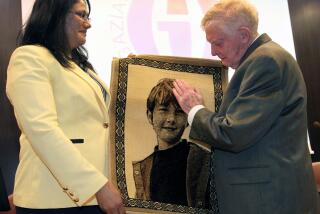A toddler transplant on ‘General Hospital’
- Share via
The premise
Jake Spencer (James Nigbor), a 31/2-year-old boy, is badly injured in an automobile accident and suffers brain damage. In the operating room, neurosurgeon Patrick Drake (Jason Thompson) performs an emergency operation in which he cuts away part of the child’s skull to relieve the pressure on Jake’s damaged brain. The procedure is not successful, and brain function is lost. Jake is left on life support with no hope of recovery. Meanwhile, Josslyn Jacks, 11/2, has developed cancer in both kidneys, and her doctor says that only a kidney transplant can save her life. But the chances of finding a match are slim. As Josslyn awaits a donor, her mother, Carly Jacks (Laura Wright), approaches Jake’s father, Jason Morgan (Steve Burton) — her former lover — to see if he might consider volunteering Jake as the donor.
The medical questions
Is an emergency decompression commonly performed after traumatic brain injury, and how successful is it? Would a patient in that condition be a viable organ donor? Is it plausible for a patient with bilateral kidney cancer to receive a kidney?
The reality
Emergency decompression of the brain — known as decompressive craniectomy — is not uncommon after traumatic brain injury; the procedure was used to treat Rep. Gabrielle Giffords (D-Ariz.) after she was shot in the head in January, for example. Success largely depends on the severity of the injury, says Dr. Ulrich Batzdorf, professor of neurosurgery at UCLA.
The procedure has a long history, rooted in a primitive operation known as trepanning, in which the skull was opened to treat various health problems. The modern version of the operation was used by Vietnam War-era neurosurgeons and has recently regained popularity as a way to treat intractable increases in intracranial pressure in soldiers with blast injuries from service in Iraq. Studies over the last decade (including ones in children, whose brain swelling after injury is more pronounced) showed that it improves outcome, says Dr. Erik Parker, assistant professor of neurosurgery at New York University Langone Medical Center. The most common procedure involves removing a large part of the skull on one side, Parker adds, to increase room for the swollen, injured brain tissue so that it isn’t crushed and injured further by being contained within the skull or its blood flow compromised. Combined with medications to reduce swelling, the procedure helps the brain to survive until it returns to its normal size. Often the frontal, parietal, temporal and occipital bones are removed, generally on one side. In the fictitious case of Jake, just temporal bones were removed; this is unikely to adequately reduce the pressure.
If the patient loses all essential brain function, he or she could certainly be a kidney donor, provided that blood pressure is maintained at reasonable levels so the kidneys don’t get damaged. However, it’s very unlikely that Josslyn, with cancer in both her kidneys, would require or qualify for a transplant. Kidney cancer in a young child is usually a Wilms tumor, says Dr. William Carroll, professor of pediatric oncology and director of the NYU Cancer Institute. It is generally highly curable with a combination of chemotherapy, partial kidney removal and sometimes radiation. Even if a cancer develops in the remaining kidney, a transplant would still not be indicated. “I’ve never heard of a kidney transplant being needed or used in such a case,” Carroll says.
Unfortunately, Jake’s tragic case and the futile attempt to save him are both fairly realistic. But kidney transplants in infants — along with tortured plots in which ex-lovers with embattled pasts and gravely sick children come together to make heart-rending decisions — occur far more often on “General Hospital” than in the real world.
Siegel is an associate professor of medicine and medical director of Doctor Radio at NYU Langone Medical Center.
‘General Hospital’
ABC, SoapNet
March 21






